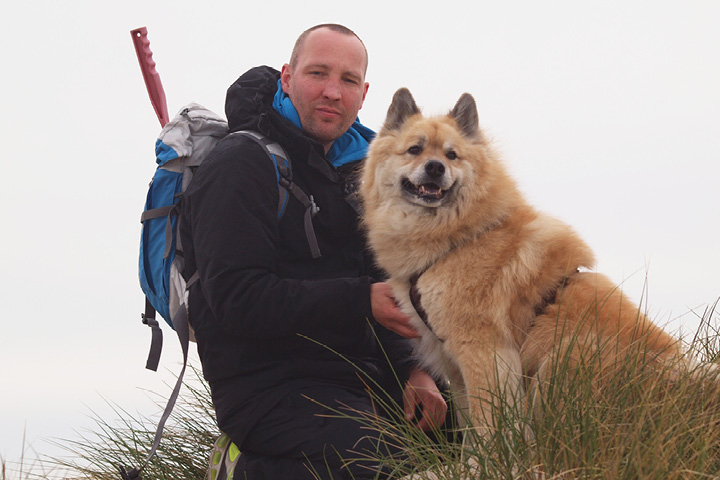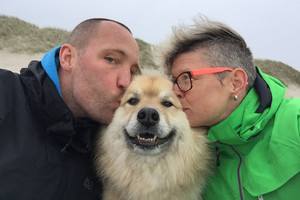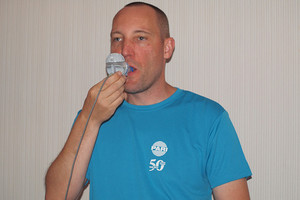Tuesday, 14. January 2020

When one’s partner has a chronic illness, this can’t help but have an effect on a relationship. The PARI blog is highlighting this sensitive topic with several interviews from the perspective of both the healthy partners and the ones with the chronic illness. In today’s blog post, Sven Weiboldt talks about how his primary ciliary dyskinesia (PCD) affects his relationship with his wife.
Sven Weiboldt: At the start of our relationship I didn’t know that I had primary ciliary dyskinesia (PCD). It was clear that something wasn’t right, because I coughed a lot, had unusual amounts of phlegm and my lungs were very sensitive to changes in the air. For example, I cannot tolerate the smell of chlorine in an indoor pool at all. This was all very unpleasant for me, but we didn’t need to talk. It was obvious that I have some sort of respiratory problem. But I didn’t find out what was causing all my symptoms until 2013. At that point we had already been together for 21 years and had just gotten married. It wasn’t until then that my chronic disease was something my wife and I discussed. I had a lot of tests. I started getting tested because we found out I was sterile. This situation in combination with my respiratory problems caused my doctor at the time to refer me to a special clinic. There I was diagnosed with primary ciliary dyskinesia (PCD).
Sven Weiboldt: We went to the clinic dreading what we might hear and we were both very upset during the appointment with the lung specialist. The doctor was very nice. He presented the results to us and explained everything. We sat there meekly and listened to everything he had to say. First, we were relieved to know what it is that I have. We both hoped that I could finally start getting the right treatment. But we were also sad and overwhelmed. We didn’t really what to do with this diagnosis of PCD. The only thing that was clear was that PCD is a rather serious illness. The period right after we got the diagnosis was very difficult for me. I felt guilty. Because I was the reason we couldn’t have children. And now I also had this illness that would have a lasting impact on our life together. After the diagnosis we talked a lot about my illness – well mostly I did and there were also times when I talked about it too much.
Sven Weiboldt: Every day I talked about how we should proceed. When I got the diagnosis I felt inundated by negative things: having to change my lifestyle, the treatment, I was worried what the future might hold: A lung transplant? Early death? I worried about my job. Due to my high number of sick days, even before the diagnosis I had to go see human resources more frequently. What would happen now? How much longer would I be well enough to work? I am the primary breadwinner. What will happen to my wife when I can no longer work? This new situation put enormous psychological pressure on me. So I was often in a bad mood, I whinged and complained to my wife about my woes every day. And then at one point my wife said to me, “Every day you tell me the same old story. Enough is enough. I can’t do anything about this disease either.” She was right. I had whinged and complained to her nonstop and had been reduced to this bad-tempered and anxious person. Certainly not the type of person anyone would want glued to their hip! So I decided to start going to psychotherapy. Now I sometimes think that if I hadn’t gone to therapy then, our relationship might have ended.
Sven Weiboldt: No, not at all! Quite the opposite. After I was diagnosed, I offered her the option of leaving me, even though we had just gotten married. After all there was no hope of having kids for anyone in a relationship with me. Being childless was very stressful for my wife and me. And then I had definitive proof that I was pretty sick.

Sven Weiboldt: (laughs) You should really ask my wife. But I think because we have a very happy relationship and we love each other. We have gotten even closer after getting through all the tough times we’ve had to endure in the last few years. We get along really well and laugh a lot together. And I think that I am more sympathetic than most healthy men. Because of my health problems I can really appreciate what she is going through when she doesn’t feel well and support her better. I also think I appreciate all that my wife does for me more than healthy men do. By that I mean both that she is always there for me and stands by me, and also the totally mundane things like housekeeping, shopping, the everyday stuff. I also try to help out in the house, more than men who are focussing on their work and careers do.

Sven Weiboldt: I have incorporated my inhalation therapy into our daily routine. If I have a lot of mucus to cough up, I go into another room. But in the evening I often do my evening inhalation therapy in the living room with my wife while we watch television. Of course the disease impacts our life as a couple to a certain extent. I need to do everything I can to avoid getting respiratory infections. So I avoid public events and even gatherings with family and friends if anyone has a cold. My wife then either goes alone or doesn’t go. When my wife is sick we avoid kissing so I don’t catch whatever she has. I have less stamina as I get older and my lung function worsens. This also impacts physical intimacy. Initially this was a totally taboo topic. But we have adjusted to this as well. And now we experience physical intimacy even more intensely. A chronic illness brings some negative and challenging aspects to a relationship. But we make the best of it and enjoy every moment that we have. How many people can say they have been together since they were teenagers and that they are still happy in their relationship after more than 20 years?
Note: The statements made in the interview are the individual views of the interviewee. They do not necessarily reflect the PARI view or the general state of science.
An article written by the PARI BLOG editorial team.
© 2024 PARI GmbH Spezialisten für effektive Inhalation